Fire argument 28-I art brigade in East Prussia
28-I artillery brigade. One of the artillery units of the 1 Army of the North-Western Front. One brigade division had the honor to distinguish itself during the Gumbinnensky battle of 7 in August, and the other in the First battle at the Masurian lakes of 30 in August of 1914.
In the fire of Gumbinnen.
A difficult week of mobilization quickly passed, and another week of anxious waiting at the forts of Kovno fortress passed behind it, and finally, on August 4 1914. The 28 artillery brigade passed the German border from Shirvinda. From the south came the continuous thunder of artillery, and clouds of shrapnel were sometimes visible in the clear sky: this was a successful battle near the Stlupenen 29-I Infantry Division. The traces of the war were already noticeable: on both sides of the highway, the corpses of horses, rows of small, hastily dug trenches are visible, barbed wire stretched in some places. From the side of Stallupena there was a huge glow, the battle calmed down, and only occasionally came some dull shots.
Frightened by the false assurances of the German government, the local population in a panic fled before the Russians inland, leaving the property to the mercy of fate. A strange impression was made by neat German villages, in which there was not a soul, and only the abandoned cattle announced the neighborhood with a mournful roar. Right and left, fires flared up now and then - the work of elusive spies - and thick plumes of smoke marked the path of Russian soldiers.
The last "peaceful" overnight stay was in the village. Vitkampen. Occasionally, rifle shots came from the guards: the infantry had already come into contact with the enemy. As soon as the sun rose, German artillery opened fire: in response, the 4-i battery, which was in the vanguard of the brigade, rumbled very close. The gunners' faces became serious at first, but then the high gaps of the German shrapnel caused a smile and even critical remarks of our soldiers: “You can't kill a lot of things like that”.
Scouts from the 5 and 6 batteries came forward. The smooth lines of the advancing Russian infantry were clearly visible from the hills. On the right, the 4-I battery was beating with volleys. Suddenly 4 shook the earth and huge pillars of stones and earth, which rose from the 4 battery, showed that German heavy artillery opened fire on it. But the Germans continued to stubbornly put their shells into a shallow hollow that was half a kilometer away from the battery - thinking that there was a battery in it.
Having received information from advanced intelligence, as well as having learned the situation from the commander of the 110 Infantry Regiment, the commander of the 2 Division, Colonel MK Shtakelberg together with the commanders of the 5 and 6 batteries, Lieutenant Colonels Abert and Rodovich, under a strong artillery fire. the enemy personally chose a firing position in 1500 meters northeast of the sites. Brakupen A high pumping station in m. Brakupenen was chosen as an observation point. From it, the German positions were perfectly visible. But the water tower was a great target for the Germans. There was nothing to do - it was necessary to take risks, since the German batteries rattled the Russian infantry. Second Lieutenant Verevkin volunteered to be an observer. They held the phone, and the batteries under the command of the captains Bugreev and Protasovich famously carried the position.
From the observation point, the three German batteries were clearly visible - and after the report to the division commander, within a few minutes, the 5-I battery opened fire on the nearest German one. Not seeing the Russian battery, the Germans opened the strongest artillery fire at the observer: heavy and light shrapnel and grenades literally bombarded m. Brakupenen and the water tower, on the wheel of which the brave lieutenant, Verevkin, sat. It seemed that it was impossible to get out of this hell alive — and only periodic beeps of the phone with messages from the observer proved that the second lieutenant was alive and continues his work. Exceptionally due to his observations, the nearest German battery, which tried to target in the division, was forced to shut up after several fugitive volleys of the 5 battery. The attempt of the Germans to remove the battery from the position failed: its front end was broken.
Then the division commander ordered the 6 battery to open fire on the next German one - and after a few minutes the German crews ran away from their guns. The heavy battery of the Germans, who was standing to the left, first groped Russian batteries to no avail, and then concentrated fire on the town of Brakupenen - trying to destroy the house on which the pumping engine was standing. But then 5-i and 6-i batteries hit her.
A few minutes of quick fire - and the heavy battery of the Germans suffered the sad fate of the two previous ones.
Meanwhile, the town of Brakupenen was ablaze, the house where the observation point was located, caught fire, and the valiant lieutenant Verevkin had to leave it. Until late in the evening, the batteries fired at the German infantry, periodically returning to the German batteries, preventing them from opening fire.
1. Field gun in battle. 1914
The 7 of August came - the day when the terrible blow of the German 28 Army Corps attacked the 1 Division, reinforced by parts of one of the divisions of the Königsberg garrison. The valiant Russian infantry persevered, inflicting terrible losses on the opposing enemy. In the giant pot of Gumbinnen, the best divisions of the Russian and German armies grabbed.
Next to the batteries, rifle bullets began to whistle. Under the killing fire of the Germans, half-thinned out and having lost almost the entire officer corps, the infantry of the 28 division slowly retreated until, finally, it retired beyond the artillery line.
Less than a kilometer in front of the batteries was the highway. The division commander M. K. Stackelberg ordered his batteries to send guns at him. The terrain behind the highway was going down, and through the binoculars, the movement of dense masses of German infantry was clearly visible. Minute - and on the highway gushed gray waves of people in pointed helmets.
The infantry went on the attack on the batteries.
Gunners opened fire. The highway was clouded with smoke, and when it cleared, no one was already on it - only the white canvas of the road turned gray from the mass of German corpses lying on it. The second wave of attackers rushed forward. A quick fire again and it became clear on the highway again.
Then an airplane-spotter with black crosses flew over the Russians, and the hell began on the batteries. Invisible German batteries bombarded them with a hail of shells. The huge hayloft, located to the right of the 6 battery, flamed up, and the entire field was covered with black smoke - under its cover the German infantry was advancing on the division and was already bypassing the 4 battery. The hero of the day, the observer-lieutenant, died the death of the brave, shot by German infantrymen. The 4-I battery struck point-blank, and machine guns were already cracking in its rear. When the smoke cleared, it became clear that the glorious 4-i battery died completely - and the German infantry was already on it.
German infantrymen approached the 5 and 6 batteries for the 500 distance - 600 steps and fired at the gunners. The gunners beat on them, but now with a rare fire - the shells ended. The whole field was littered with the corpses of the Germans, and they did not rush to attack.
2. Field battery in battle
Then the division commander ordered the 5 battery to retreat under the cover of the 6 battery. Then 6 was supposed to depart. But the front of the 6 battery, which had fallen under heavy enemy light and heavy artillery in the morning, withdrew, and there was no connection with them - both of the orderly communications were killed. Then the commander of the 6 battery, the valiant Lieutenant Colonel Abert, firing the last three shells, ordered the soldiers to remove the bebut daggers, and the officers the revolvers - waiting for the German bayonets. There was no salvation for the battery left without the front end - even though the German artillery no longer fired, but the rifle bullets whistled in all directions. The gunner 1 of the gun Stepanov and several other people died.
Suddenly, there was a horse trampling and a crash of wheels - the front end of the 5 battery rushed up at full career - they picked up the neighbors' guns and quickly pushed them away. The 6-I battery was saved. The battalion commander was the last to leave the battlefield - after making sure that the 5-i and 6-i batteries had retreated, and the 4-i could no longer be helped.
But the feat of the gunners was not in vain - the Germans who suffered terrible losses did not go further.
Battle at the lakes.
In the First Battle of the Mazury Lakes, the Germans ousted the 1 Army from East Prussia - left alone after the defeat of the 2 Army, it was forced to retreat under the pressure of superior enemy forces.
30 August The 28-Infantry Division fought on the left flank of the army near the village. Didshullen, holding back bypassing the superior forces of the Germans. Was ordered to withdraw. But it was a shame to retreat: from dawn to 14 hours, the division not only successfully restrained the Germans, but even threw the enemy back. The 6-th battery of the 28-th artillery brigade hit a German armored car, and the 3-nd battery almost completely destroyed the German light battery that had come out of the position.
But I had to submit to the sad need. The left column of the division, consisting of two regiments and the 1 division of the 28 artillery brigade, headed for Stallupen. The commander of the 2 brigade of the 28 division headed by Major General E. A. Rossiysky, temporary commander of the 28 artillery brigade Colonel V. Ye. Nasekin and commander of the 1 division Colonel V. Ya. Burkhanovsky moved in the head of the column.
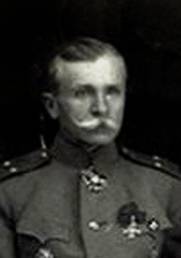
3. E. A. Russian.
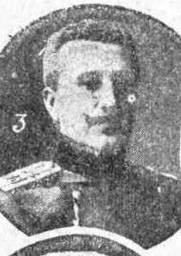
4. V. Ya. Burkhanovsky.
Then the 2-i battery moved under the command of Lieutenant Colonel V.I. Sosnovsky.
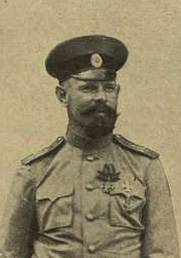
5. V.I. Sosnovsky.
The column was moving quite calmly: no one expected an unpleasant surprise. But before the head of the column reached the edge of the forest near the village. Tolmingkemen, as a hail of bullets fell: several gunners were wounded, 5 horses were killed and wounded. Despite the surprise of the attack, the gunners were not taken aback: the senior officer of the 2 battery, the staff captain Stogov immediately removed the first gun from the front and opened fire on the village. A few minutes later, the shots from the village ceased, and the infantry coming up from the tail of the column swept it with a chain, finding the bodies of two German soldiers and traces of an ambush. Movement to the east continued.
Around 16 hours the column approached the village. Ozheningken, when the bullets suddenly fell again, and shrapnel began to break over the column with a dry crack - the second ambush was more serious. Immediately, the first gun of the 2 battery was directly removed from the front of the highway and opened fire on the village, and the remaining guns, famously jumping over a roadside ditch, were carried to the position on the highway and also removed from the front.
But before the 2-I battery managed to remove from the front, a hail of shrapnel was falling on it, sent from German batteries that were invisible to the eye: they were beating from the front, and to the right, and to the left. There was nothing to think about shelter - an attempt to dig at least small trenches, caused even more fierce German fire.
The heroic contest of an open Russian battery with three German batteries in a closed position, as well as with German infantry began. V. Ya. Burkhanovsky and V. I. Sosnovsky were on the battery, a few steps from its left flank and jointly controlled the fire.
The battery worked smartly and calmly: no one needed prodding or reminders, everyone knew that the question was about life and death, striving for one thing: to fulfill your duty until the end and to sell your life more expensively. In the eyes of the brigade commander, the glorious battery melted away - the shields did not withstand fire from close range, depriving the calculations of the last shelter. One by one people were out of action. By 19 hours the losses in people were so great that Lieutenant Kalabukhin began to perform the duties of a loader, but during the opening of the gun lock a fragment shattered his right arm.
The commander of the half-battery, Lieutenant Kalachevsky, was seriously wounded by a shell fragment in the stomach, and only two officers remained on the battery and, according to 2, the 3 numbers per gun. But the battery fire did not subside: on the contrary, the guns thundered even more vigorously, as if wanting to avenge the enemy for their heavy losses.
Twilight descended. There seemed to be no hope of saving the battery: there were almost no people, half the horses were slaughtered, the shells were running out. But no one thought about death - the gunners were imbued with the consciousness of the great task that fell to the battery: with its fire it held back the advancing enemy for several hours, diverting its murderous fire to itself and allowing the whole detachment to turn into battle formation. A little more - the column will unfold, and the task will be completed.
But in the current hopeless situation, Lieutenant Colonel V.I. Sosnovsky ordered the gunners to get ready to take down their guns, leaving only two to repel the enemy's bayonet attack. And the bayonet attack was already close - the German infantry, using twilight, crawled on the edge of the village and slowly advanced on the battery.
But here at the last minute (as it often happens in films, but how, fortunately, it happened in stories 2 battery 28 artillery brigade) 2 dismounted hundreds of divisional cavalry - 3 Don Cossack Yermak Timofeyev Regiment. The Donets silently moved forward and covered their perishing battery with their breasts. A few minutes later, the guns were removed from the position one by one, and the Germans, who were counting to seize a weakened battery without a shot, were met with a hail of bullets and bayonets from the donts - and ran.
Russian artillerymen successfully acted in the most diverse combat conditions, showing ingenuity and high professionalism, helping the infantry more than once and deciding the fate of battles and battles.
6. Battery firing position.
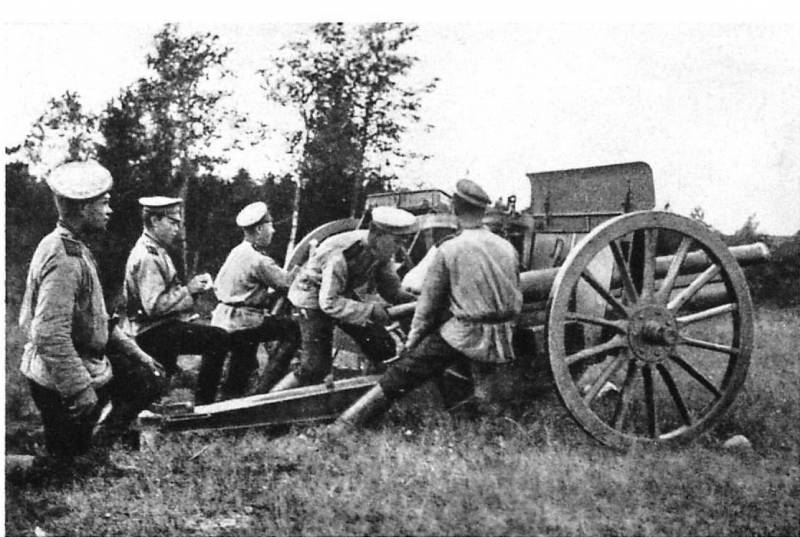
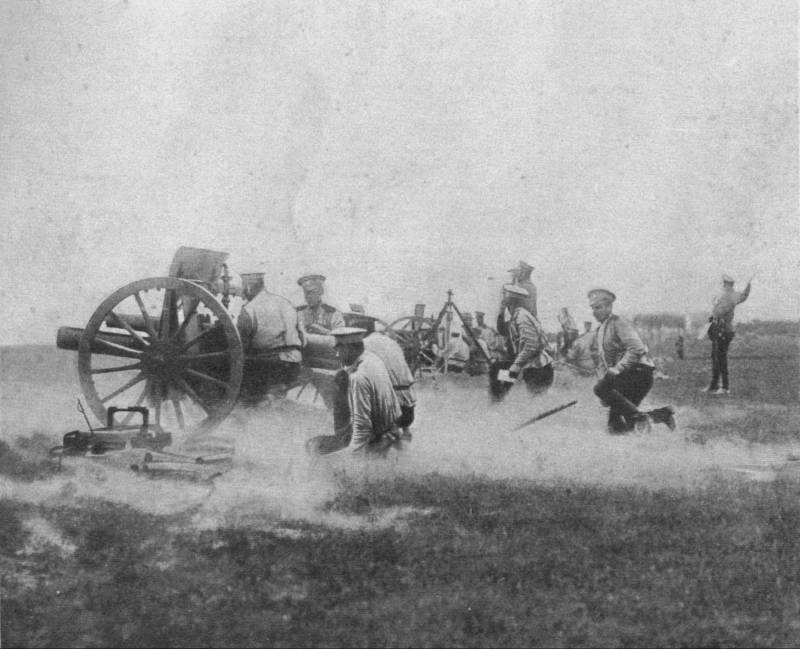
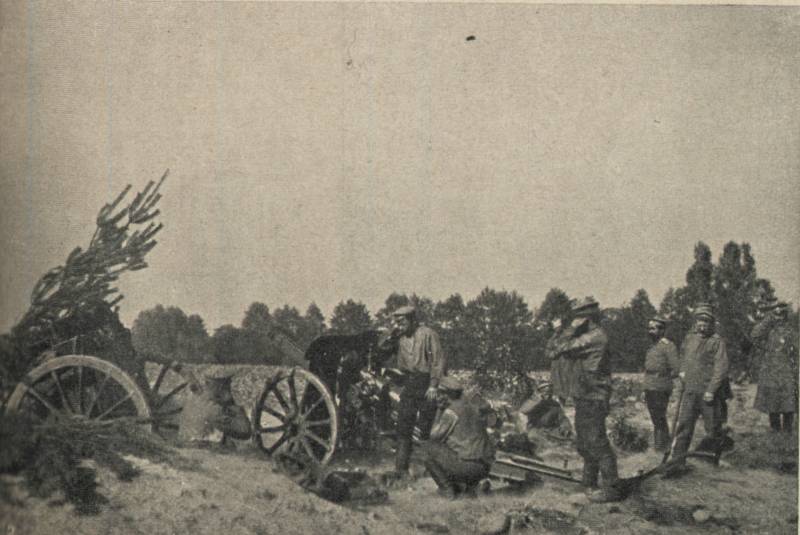
Information